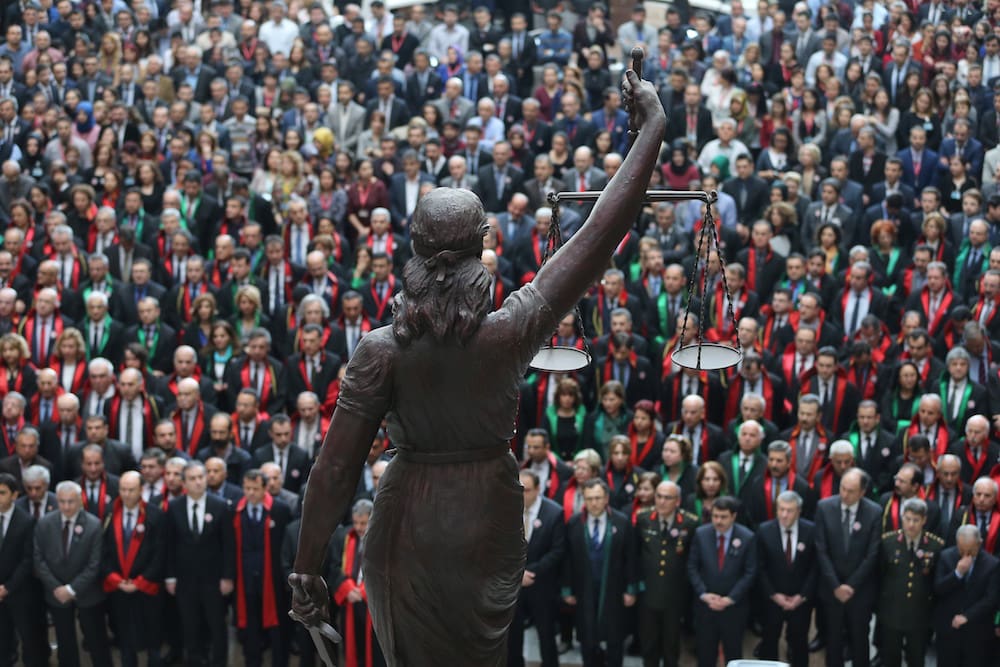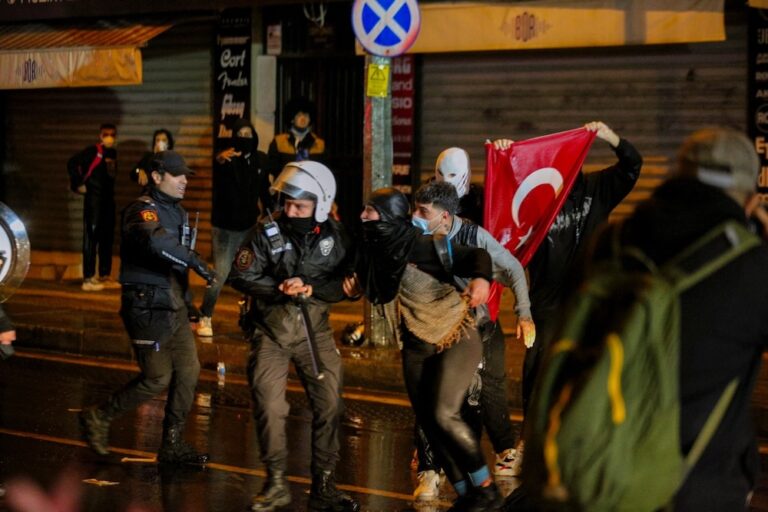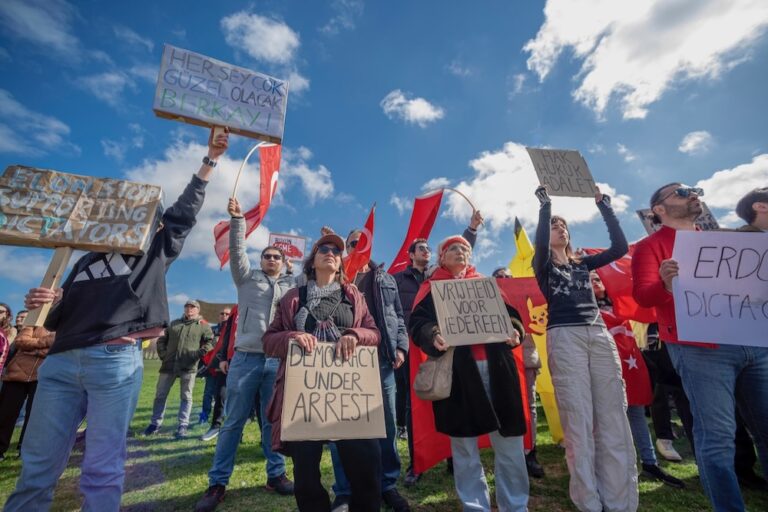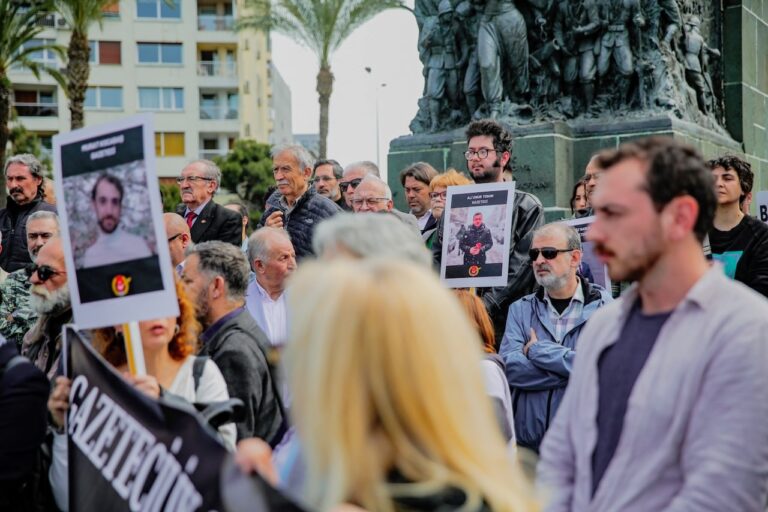Based on the findings of a mission by press groups to Turkey, the report finds the judiciary unfit for purpose and calls for - among other things - the urgent revision of all anti-terror and defamation laws, and the end of the deliberate conflation of public criticism with terrorism propaganda.
This statement was originally published on freeturkeyjournalists.ipi.media on 18 November 2019.
The International Press Institute (IPI) highlighted the continued jailing of over 120 journalists in Turkey as a deep stain on the country’s human rights record at the launch of a joint report by eight international press freedom and journalism organizations on the status of press freedom in the country.
Turkey’s Journalists in the Dock: The Judicial Silencing of the Fourth Estate underscores the depth of Turkey’s now three-year-crackdown on the media despite the Turkish government’s attempts to distract from it. It calls on Turkey to release all jailed journalists, stop the arbitrary persecution of the press, revise anti-terror and defamation laws, and end political interference in the judiciary.
The report is the result of a collaboration among IPI, ARTICLE 19, the Committee to Protect Journalists (CPJ), the European Centre for Press and Media Freedom (ECPMF), the European Federation of Journalists (EFJ), Reporters without Borders (RSF), Norwegian PEN, and PEN International. It reflects the findings of a joint mission to Turkey from September 11 to 13, during which the eight groups met with Turkey’s Constitutional Court, the Supreme Court of Cassation and the Ministry of Justice, as well as Turkey-based civil society groups and journalists.
The report reveals an excess of egregious violations of fundamental rights, with dozens of journalists held on the most serious terrorism-related charges for months, sometimes years, based on the flimsiest of evidence in which critical journalism has been conflated with terrorist propaganda, all part of a campaign to silence opposition voices and close down free speech. The mission largely failed to assuage these concerns.
The Executive Summary of the report can be found below but three key issues that stood out:
- The endemic weaknesses of a judiciary submerged by tens of thousands of cases while simultaneously suffering the loss of a third of its own judges, and presided over by a management body under effective executive control, render it unfit for the task.
- The government’s judicial reform strategy (JRS), launched in May, fails to substantively address any of the principal obstacles to an effective and independent judiciary, suggesting its real purpose is to give the impression of reform while in fact normalizing state-of-emergency-style justice.
- The approach of Turkish officials and courts toward fundamental rights remains highly problematic, particularly concerning the conflation of critical journalism with support for terrorist groups. In particular, European Court of Human Rights (ECtHR) jurisprudence on the protection for freedom of expression is not observed.
The public launch of the report took place at a public discussion in Brussels on November 18, where leading journalists from Turkey testified on the prosecutions facing journalists in the country and debated the opportunities for European engagement.
Alice Kuhnke, Swedish MEP for the Greens and a critic of Turkey’s human rights failings, joined the panel to debate the responsibilities of the EU and opportunities to support press freedom in the country.
Over two days in Brussels, mission members are presenting their findings to EU leaders and policy makers and holding discussions on how the EU can best engage to support Turkey’s journalists.
“The plight of Turkey’s journalists is but the tip of the iceberg of a much broader issue of systemic human rights abuse,” said Scott Griffen, IPI deputy director. “European institutions must insist on substantial reform and not allow the Turkish authorities to gloss over the abuse with promises of superficial change while hundreds continue to pay the price of this abuse with the loss of their liberty.”
Executive Summary: Findings and Recommendations
Findings
- The press freedom environment in the country has not improved since the lifting of the state of emergency in July 2018. Scores of journalists remain behind bars or under travel bans as a consequence of an extended, politically motivated crackdown against the media.
- A subsequent wide-ranging capture of the judiciary has progressively and severely damaged the rule of law and the public’s right to access information.
- The removal of up to one-third of judges and a wave of cases resulting from the post-coup-attempt crackdown has placed a burden on the judiciary but cannot be used as an excuse to fail to offer redress to ongoing, systemic and severe violations of fundamental rights.
- The judicial reform strategy (JRS), announced in May 2019 by the Turkish government to address flaws in the justice system, will not be credible unless it guarantees judicial independence in both law and practice and ends the arbitrary persecution of journalists.
- The Constitutional Court has made inconsistent rulings on freedom of expression cases. Where it has found in favour of journalists in line with ECtHR standards, rulings have been met with resistance and obstruction in the lower courts. These developments evidence political interference in the judiciary.
- The mission recognizes the terrorist threat in Turkey but rejects arguments made by the Supreme Court of Cassation that this justifies exceptional measures outside ECtHR jurisprudence and that fundamental freedoms need to be compromised in the name of security. The state’s actions clearly demonstrate that the existence of a terrorist threat is being instrumentalized to serve as an indiscriminate crackdown on critical voices. The continued conflation – by the Turkish government, prosecutors and courts – of journalistic work with terrorist propaganda underscores this fact and was a consistent theme in the mission’s meetings with the authorities.
- The delegation welcomed the Supreme Court of Cassation’s ruling to overturn convictions for defendants in the Cumhuriyet trial, but noted that it cannot reverse the personal damage done to those defendants as a result of their extended imprisonment. It further condemned the court’s decision to bring new, more serious, charges against Ahmet Şık.
- The delegation was profoundly alarmed by the new powers of Turkey’s audio-visual regulator, the Radio and Television Supreme Council (RTÜK), that extend the agency’s control to online broadcasters, threatening their existence through a costly and opaque licensing regime. The lack of a narrow definition of online broadcasting potentially empowers the state to regulate all online activity.
- The accreditation of journalists and the system of issuing press cards is in need of substantial reform. In the past three years it has seen the refusal of thousands of applications and the removal of hundreds of press cards on security grounds and has been further abused to restrict the work of foreign correspondents in the country.
Recommendations
- Turkey must urgently revise all anti-terror and defamation laws, repeatedly abused to silence the critical press. In particular it must end the deliberate conflation of public criticism with terrorist propaganda.
- It should take immediate steps to end the arbitrary prosecution of journalists, characterized by baseless indictments, politically driven judgments and severe violations of the right to a fair trial. All jailed journalists should be freed without delay. It should likewise end the misuse of travel bans that needlessly perpetuate the punishment of journalists.
- It should end political interference of the judiciary, including repealing the April 2017 amendment to article 159 of the Constitution, which allowed for direct political control over the nomination procedure to the Council of Judges and Prosecutors, affecting the independence of the entire judicial system.
- RTÜK regulation of online broadcasters must be reviewed to clearly define and limit the scope of regulation to commercial broadcasters to avoid it being used against any government critic.
- A new transparent and open system of press accreditation that is independent of government should be introduced that puts journalist organizations at the centre of the process. Foreign journalists must also be able to attain accreditation and to work free of harassment.
- The persistent refusal of the authorities to allow prison visits is a humanitarian issue that must end. Human rights and solidarity organizations for journalists should be enabled to visit detained journalists.
- Turkish authorities should closely and genuinely involve independent civil society, journalists and international experts in discussions about freedom of expression, judicial independence and the rule of law to guide reforms that bring the independence of the judiciary in line with Turkey´s commitments under international human rights law.
- The TCC [Turkish Constitutional Court] must give priority to applications regarding detained journalists and administrative measures blocking websites, including Wikipedia, banned in Turkey for two-and-a-half years. The delays in these cases seriously harm the public’s fundamental right to access information.
- The TCC should improve its consistency of rulings involving journalists to end any ambiguity as to whether journalism can be used as evidence of terrorist propaganda.
- The rulings of the TCC should be respected by lower courts and implemented without delay in line with article 153 of the Constitution.
- TCC rulings that set precedents emphasizing that freedom of expression is a fundamental right and that journalism is not evidence of terrorism must be followed by lower courts.



